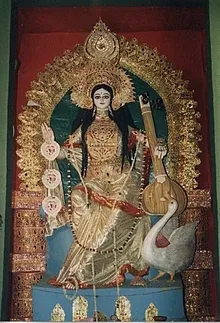Vasant Panchami, also called (Saraswati Puja) is a festival that marks the preparation for the arrival of spring. The festival is celebrated by people in various ways depending upon the region in the life in the Indian subcontinent. Vasant Panchami also marks the start of preparation for Holika and Holi, which take place forty days later.[5] The Vasant Utsava (festival) on Panchami is celebrated forty days before Spring, because any season's transition period is 40 days, and after that, the season comes into full bloom.

In Sanskrit Vasanta means spring. Panchami is the fifth day of Shukla Paksha, the fortnight of the waxing moon in the Hindu month of Magh, (January – February). Vasanta Panchami, which marks the end of the winter and heralds in spring, is dedicated to goddess Saraswati. She is a goddess of water and of a river bearing her name. Her water originates in the Himalayas, flows southeast and meets the Ganges at Prayag near its confluence with the Yamuna (Triveni). Saraswati is also a goddess of speech and learning who blesses the world with vach (words), hymns, Sanskrit and the wealth of knowledge.[2][3] It is auspicious for children to begin school and learn their first word on this day. In the ancient Indian texts, the Vedas, the prayer for Sarasvati depicts her as a pristine lady in a white dress embellished with white flowers and white pearls. She sits on a white lotus blooming in a wide stretch of water (neluhini). She holds a veena, a string instrument similar to a sitar. No animal is sacrificed and Indians have a vegetarian meal. Saraswati's prayer concludes,
"Oh, Mother Sarasvati, remove the darkness (ignorance) of my mind and bless me with the eternal knowledge."